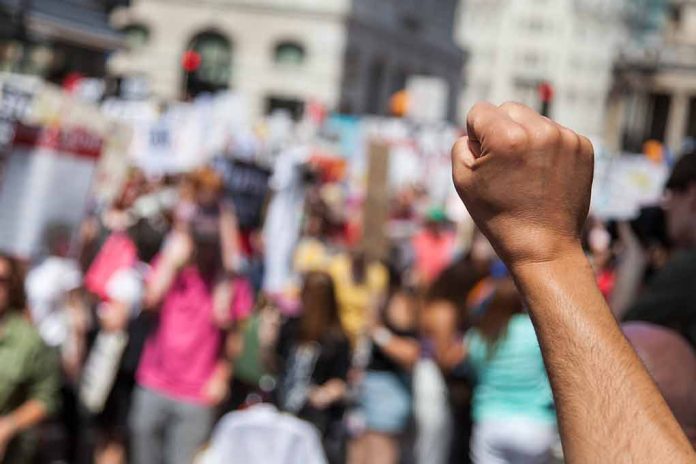
Colombia’s streets descended into chaos as truckers and passenger carriers launched widespread protests over a diesel fuel price hike, paralyzing traffic and threatening food supplies.
At a Glance
- Colombian cargo and passenger carriers protested on Wednesday, blocking access to major cities
- The protest was triggered by a 20% diesel price increase, raising concerns about food shortages
- Talks between the government and truckers have failed to resolve the issue
- President Gustavo Petro aims to phase out fuel subsidies to reduce the budget deficit
- Thousands of Colombians were forced to walk to work due to roadblocks
Protests Erupt Over Fuel Price Hike
Colombian streets descended into chaos on Wednesday as cargo and passenger carriers launched widespread protests against a recent diesel fuel price increase. The demonstrations blocked access to major cities, including the capital Bogota, causing severe traffic disruptions and raising concerns about potential food shortages.
The protests were triggered by a 20% diesel price hike implemented by President Gustavo Petro’s government. The increase, which took effect on Saturday, raised the price of diesel by $0.46 per gallon to $2.70. This move has significantly impacted the cost of shipping goods, as 90% of commodities in Colombia are transported by road.
Chaos and traffic jams in #Colombia as truckers #protest fuel #price hike pic.twitter.com/f7EL0rFTqH
— Roya News English (@RoyaNewsEnglish) September 5, 2024
Threat of Food Shortages Looms
As the protests intensified, fears of food shortages began to emerge. The Colombian government made an urgent appeal to truckers to create safe corridors for food supplies. Wholesale food markets in major cities reported receiving 23% fewer goods this week compared to the previous week, with deliveries to Bogota’s Corabastos wholesale market down by 40.3%.
“We’re issuing an urgent appeal to all the parties involved… to guarantee urgent, unrestricted passage to vehicles transporting food and other essential goods,” the agriculture ministry stated.
Farmers in the Narino and Boyaca regions have reported having to dispose of produce they couldn’t transport to market due to the roadblocks. The situation has raised concerns about the potential for widespread food shortages if the protests continue.
Government’s Stance on Fuel Subsidies
President Gustavo Petro’s administration is working to phase out fuel subsidies that have kept prices frozen since the COVID-19 pandemic. The government argues that this move is necessary to reduce the budget deficit and allocate more funds to education and health services.
“We will not give up until the increase is repealed,” declared Jorge Garcia, president of the Colombian Transporters Confederation.
President Petro has accused powerful business figures of being behind the protests and maintains that fuel subsidies are fiscally unsustainable. He stated that the goal is to “reduce public debt” and “finance the health and education of Colombians.”
Impact on Daily Life
The protests have had a significant impact on daily life in Colombia. In Bogota alone, nearly 1.6 million commuters were affected by the transport chaos. Riot police were deployed after 67 buses were vandalized or blockaded. Bus links between the capital and other cities were also disrupted, forcing thousands of Colombians to walk to work.
Colombia trucker protests threaten fuel supplies, state oil company operations https://t.co/Z3u0ShC97G pic.twitter.com/DeVXQQ1vhu
— Reuters (@Reuters) September 4, 2024
The situation has highlighted the complex challenges facing Colombia’s transportation sector. Truckers argue that eliminating diesel fuel subsidies will bankrupt their businesses, especially given the additional challenges they face, such as higher crime rates on rural roads.
Path Forward Remains Uncertain
As talks between the government and truckers have yet to resolve the issue, the path forward remains uncertain. The government claims that the new diesel price is still among the lowest in the region, but protesters remain adamant in their demands for a repeal of the price increase.
The ongoing protests serve as a stark reminder of the delicate balance between economic reforms and social stability. As Colombia grapples with this fuel price crisis, the government faces the challenge of implementing necessary economic measures while addressing the concerns of its citizens and maintaining order on the streets.
Sources
- https://apnews.com/video/bogota-colombia-government-protests-and-demonstrations-gustavo-petro-colombia-24274406efeb47d492d9f8733adb3ea0
- https://www.yahoo.com/news/traffic-colombia-descended-chaos-negotiations-202022331.html
- https://www.barrons.com/news/trucker-protests-fuel-fear-of-food-shortages-in-colombia-7b59175c
- https://apnews.com/article/colombia-truckers-protest-fuel-subsidies-ef0b6e13829b1e6f6e006e95509a2c9e
- https://www.msn.com/en-ie/news/world/colombia-trucker-protests-threaten-fuel-supplies-state-oil-company-operations/ar-AA1q1810
- https://colombiareports.com/truckers-shut-down-parts-of-colombia-over-fuel-price-hikes/
- https://www.bonpounou.com/news/traffic-in-colombia-descended-into-chaos-after-negotiations-over-fuel-price-failed
- https://www.msn.com/en-xl/africa/kenya/trucker-protests-fuel-fear-of-food-shortages-in-colombia/ar-AA1q0Fl4%3Frecoid%3Dtraffic
- https://www.riotimesonline.com/fueling-friction-colombias-diesel-price-crisis/
- https://belatina.com/airport-fuel-shortage-in-colombia-sparks-fears-of-a-venezuelan-style-collapse-is-president-petro-responsible-or-is-there-a-larger-issue/










